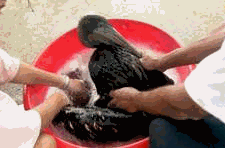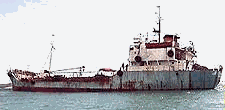State of emergency declared
for Galapagos
Oil spill
poses serious threat to wildlife in Darwin's research
grounds
Jan. 23, 2001 – Toronto Star
PUERTO BAQUERIZO, Galapagos Islands (AP) - Ecuador declared a state of emergency Monday night for the Galapagos islands, where Charles Darwin forged his theory of evolution and where a huge oil spill now poses a threat to creatures ranging from birds, to iguanas, to sea lions.
The spill began last week near the islands, a fragile natural treasure 1,000 kilometres off Ecuador's west coast. By Monday, more than 640,000 litres of diesel fuel had poured from the disabled tanker.
| The government's emergency
declaration was meant to allow for quick
allocation of funds to help pay for the cleanup. In the evening, some 30 Galapagos National Park employees in small motor boats began the slow task of skimming the water's surface around the tanker to clean slicks of diesel fuel. |
Technicians from the Galapagos |
''Our orders are to do this work until the zone is clean,'' said park employee Daniel Castro, standing in a boat near a patch of oily foam floating atop the water.
But that small fleet could not address a larger problem. Experts were monitoring intermittent slicks within a 1,264-square-kilometre area. Currents pushed the fuel to the south and - more alarmingly - west toward the bulk of islands in the volcanic Galapagos chain, a fragile ecosystem populated by animal and plant species found nowhere else in the world.
The problem began Jan. 16, when the Ecuadoran tanker Jessica ran aground in pounding surf off San Cristobal Island, the easternmost island in the Galapagos archipelago. The ship, which was carrying about 920,000 litres of diesel, started leaking fuel Friday as it tilted sharply.
Ecuadoran Environment Minister Rodolfo Rendon said about 230,000 litres were recovered from the damaged tanker over the weekend, but not before some 640,000 litres seeped through fissures in the ship's hull.
A team of U.S. coast guard specialists successfully recovered another 38,000 litres of diesel fuel from inside the damaged tanker Monday. They first pumped it into undamaged tanks aboard the 28-year-old ship, then transferred it to the another vessel, said Capt. Ramiro Morejon, chief of Control and Marine Monitoring for the Galapagos park.
Darwin, the 19th-century naturalist, developed his theory of evolution by studying wildlife on these islands in the Pacific Ocean. The islands, a part of Ecuador's territory since 1832, were formed four million to five million years ago by underwater volcanoes. Most are arid and rocky, dotted more by cactuses than lush vegetation.
Galapagos National Park spokesperson Fabian Oviedo said Monday dispersants and absorbents were being used to lessen the impact of the diesel but the fuel had already reached Santa Fe Island, 60 kilometres west of San Cristobal.
''The part of Santa Fe most affected is the coastal zone of El Miedo, populated by iguanas, sea lions and birds, such as the blue-footed booby,'' he said.
''Four sea lions stained with diesel have been spotted, as well as boobies and 30 pelicans.''
| He said most of the birds ''had been captured
and were undergoing a process of cleaning with
special detergents.'' He added monitoring flights were being conducted over Santa Cruz, the next major island over in the chain. |
|
Carlos Valle, co-ordinator of the World Wildlife Fund's Galapagos program in Ecuador, said the damage could be grave for the hundreds of sea lions and thousands of iguanas that populate Santa Fe.
''It is very difficult to move them because they are very territorial,'' he said.
''The most vulnerable animals are the blue-footed boobies, masked boobies and frigate birds whose feeding zone is in the area of the spill.''
He said some colonies of marine turtles could be threatened. But species in danger of extinction, such as the miniature Galapagos penguin and flightless cormorant, are not in danger because they live in the far western reaches of the archipelago.
The giant land tortoises, which can reach 250 kilograms and for which the Galapagos are named, are not in danger because they live in the higher elevations of the islands.
On San Cristobal, where some 4,000 people, many of them fishermen, live, radio broadcast warnings from park authorities not to eat the fish or swim in the water. Robin Betancourt, a fisherman, said he saw about 50 mullet fish floating dead in an area to the south of the island known as Manglecito.
Galapagos National Park biologist Mauricio Velasquez has said one long-term threat is the fuel will sink to the ocean floor, destroying algae that is vital to the food chain, threatening marine iguanas, sharks, birds that feed off fish and other species.
Police on San Cristobal said no charges have been filed against the ship's captain, Tarquino Arevalo, or against his company, Acotramar. But Ecuadoran President Gustavo Noboa demanded a ''detailed report'' on the cause of the accident.
Capt. Morejon said the spill could have been avoided.
''Looking at the navigation chart, in which a signal buoy was mistaken for a lighthouse, the accident was definitely caused by human error,'' he said.
Related Links
· EPA Oil
Spill Program
· Oil
Spill Web

